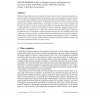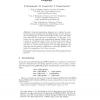480 search results - page 33 / 96 » Introducing Temporal Description Logics |
CSL
1999
Springer
14 years 3 days ago
1999
Springer
Hybrid languages are extended modal languages which can refer to (or even quantify over) states. Such languages are better behaved proof theoretically than ordinary modal languages...
LOGCOM
2002
13 years 7 months ago
2002
We present a logical approach to plan recognition that builds on Kautz's theory of keyhole plan recognition, defined as the problem of inferring descriptions of high-level pl...
SEFM
2009
IEEE
14 years 2 months ago
2009
IEEE
Interval temporal logics are based on interval structures over linearly (or partially) ordered domains, where time intervals, rather than time instants, are the primitive ontologi...
CVPR
2011
IEEE
13 years 4 months ago
2011
IEEE
We present a framework for the automatic recognition of complex multi-agent events in settings where structure is imposed by rules that agents must follow while performing activit...
ECSQARU
1997
Springer
13 years 12 months ago
1997
Springer
Abstract. Temporal programming languages are recognized as natural and expressive formalisms for describing dynamic systems. However, most such languages are based on linear ow of ...


